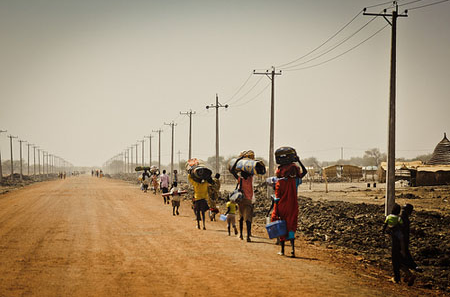The residents of the Abyei Administrative Area have reported a spike in commodity prices due to the ongoing fighting between the paramilitary Rapid Support Forces (RSF) and the Sudan Armed Forces (SAF) in Sudan.
Fighting erupted in Khartoum on 15 April and quickly spread to other parts of the country disrupting movement and the supply of goods and services leading to scarcity of commodities.
The disputed Abyei area which straddles the border of South Sudan and Sudan, and other South Sudanese towns and states on the border mostly get supplies from Sudan and have been affected by the ongoing war of attrition there.
Radio Tamazuj caught up with and sounded out Abyei residents who said prices are rising every day and that they are worried that the situation would become unbearable if the fighting in Sudan continues.
According to Nyibol Chol, soon after fighting flared up in Khartoum, commodity prices shot up.
“The prices for everything have gone up in the Abyei market and now there is hunger since fighting started in Khartoum,” she said. “25 kg of wheat flour was SSP 25,000 and it is now 28,000 in Abyei and SSP 30,000 in the Amiet market. A malwa (3.7 kg) of sorghum is still fairly affordable at SSP 1,700.”
Another Abyei dweller, Athieng Achier, said she is worried about what will happen to her family if the situation does not change for the better.
“At the time the fighting in Sudan started, the cost of living here was already too high and now a 25 kg of flour has shot up to SSP 30,000 and the 50 kg of sugar is at SSP 65,000 yet it was 49,000 SSP,” she said. “The malwa of groundnuts was at 2,000 and now costs SSP 2,500. A big sack of onions is SSP 110,000 and is not available in Abyei and Amiet markets. So, things are hard nowadays.”
Meanwhile, Kuk Osman Chol, a driver in Abyei said no goods are coming from Sudan and some stocked commodities were transported to Western Sudan and Kordofan.
“The prices increased due to fighting in Khartoum and these days no goods are coming from Sudan and what was stocked is now finished,” he explained. “50 kg of sugar is now sold at SSP 63,000 in the Abyei market and 65,000 in Amiet because it is taken from Abyei to the Amiet market. 20 liters of diesel is at SSP 30,000 in Abyei and 35,000 in Amiet and one bag of cement is 20,000 and is not available in all the markets.”
According to Osman, there is no fuel in Abyei and stocked commodities were taken from Amiet to supply the nearest Sudanese markets of Muojglad, Dubab, and Nyama in the Kordofan region.
For his part, the secretary general of the Abyei Chamber of Commerce, Chol Kuol Miyen, confirmed the skyrocketing prices.
“The business activities in Abyei are not going well and there is a rapid increase in prices,” he said. “A sack of sugar this (Wednesday) morning shot up to SSP 70,000 because the traders are now taking goods to the towns of Nyala and Al Fasher in Sudan’s Darfur region.”
“25 kg of flour jumped from 24,000 to 28,000 and a bag of rice (20kg) which was 15,000 is now SSP 18,000,” Kuol added.




